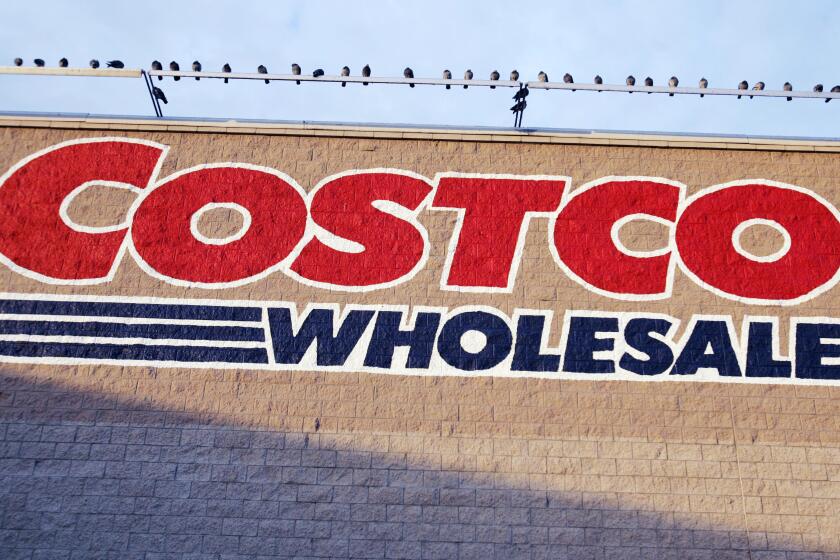Chief executive may not be a good fit for Gap, analysts say
The theme of Gap’s holiday ad campaign suited the season.
It was, as the company put it, about “spreading peace and love.”
What it failed to spread, however, was what Gap Inc. really needed: stronger sales and profit.
The gloomy holiday results reported Thursday by the parent of 3,200 Gap, Old Navy and Banana Republic stores have again raised questions about the fate of Paul Pressler, who has been chief executive of the San Francisco-based retailer for more than four years.
“I think he’s had enough time to improve the fortunes at the Gap,” analyst Robert Buchanan at A.G. Edwards & Sons Inc. said Friday. “I do not think that, even over time, he’s going to be able to improve the fortunes at the Gap.”
Analyst Christine Chen, who owns Gap shares, agreed that some sort of shake-up was likely.
“I think the fact that the turnaround didn’t materialize for holiday increases the chances that there will be a change in management -- [Pressler] or somebody else,” said Chen, who works for Pacific Growth Equities in San Francisco. “I expect there will be a change somewhere.”
The company could already be moving in that direction. On Thursday, the retailer said the management team and the board were “reviewing Gap and Old Navy’s brand strategies” but declined to elaborate.
“For me, that’s code for ‘Out with the old and in with the new,’ ” said analyst Todd Slater of Lazard Capital Markets.
Gap spokesman Greg Rossiter on Friday declined to “speculate on the future” as it related to Pressler.
“I think it’s clear that the board, the management team are highly engaged and committed to turning around the business,” he said. “They will make the necessary changes to turn around the business.”
The last time Gap Chairman Robert Fisher publicly expressed support for Pressler was a year ago, after another weak holiday season.
The company hasn’t been quick to change chief executives in the past. Pressler, formerly head of Walt Disney Co.’s $6-billion theme park and resort division, is only the third CEO since Gap opened its first store, selling Levi’s jeans, in 1969. Founder Donald Fisher held the post until 1995, when Mickey Drexler took his place, turning Gap into an icon of the casual set.
Analysts say Pressler’s biggest shortcoming is that he has failed to consistently stock stores with merchandise compelling enough to win back customers who abandoned Gap and Old Navy for a phalanx of tough competitors.
“He’s a fine executive, smart guy, nice guy, but I think he’s miscast running a retail company,” Buchanan said. “I think the numbers speak for themselves.”
Sales at stores open a year or more fell 8% in December from a year earlier, the same drop they logged in November. Same-store sales have advanced in only two of the last 31 months. The company also lowered earnings projections for the year after slashing prices to clear holiday merchandise from its Gap and Old Navy stores.
Revenue has failed to advance for seven consecutive quarters as of the last earnings report, and profit has slipped for five quarters in a row.
“I think the prospect of a regime change increases with every month,” Slater said.
The picture looked brighter earlier in Pressler’s tenure. He made a variety of improvements at Gap, including closing poorly performing stores and upgrading customer service and marketing. He tightened inventory control, introduced technology that helped determine when to lower prices and improved management of the supply chain. He also has almost eliminated the company’s debt, which totaled $3.2 billion when he came on board.
“To give Paul Pressler credit, he brought in a lot of business disciplines and controls to the company that were much needed and was very much responsible for cleaning up their balance sheet,” said Margaret Taylor, senior analyst for Moody’s Investors Service.
Pressler built his own management team, setting in motion a revolving door that has kept spinning. A string of former Disney employees joined him at Gap, including Cynthia Harris, who was named president of the namesake division in May 2005.
He also launched Forth & Towne, a chain that targets baby boomers, in August 2005. In October, the company began testing Piperlime, an online shoe division that sells a variety of brands.
But sales began sagging again about midway through his tenure.
Some analysts grumble that Pressler should spend more time focused on Gap and Old Navy and less on new initiatives. The company should “jettison or sideline projects that are too small to be meaningful and a distraction from management’s goal to reinvigorate” the core brands, Slater said.
Others say there’s no guarantee that a new chief executive would be able to solve Gap’s problems, at least not quickly. Further, given that Gap and Old Navy got new divisional heads in the last two years, it might be too disruptive to lose Pressler now, said Betty Chen, an analyst with Wedbush Morgan Securities in Los Angeles.
“I think it might be too much too soon if they were to announce a new CEO,” she said.
Not surprisingly, Gap stock has far underperformed its peers since Pressler became CEO in September 2002. But the shares have risen 58% on his watch. It closed Friday at $18.89, down 55 cents.
Gap shares have been buoyed by a large-scale buyback -- the company has spent $3.8 billion to repurchase about 20% of the shares outstanding since October 2004 -- and, analysts say, chatter that the retailer could be a buyout candidate.
Some analysts consider that unlikely, because the company wouldn’t come cheap -- it has a market value of $15.3 billion -- and because Gap leases its stores. Potential acquirers tend to like businesses that own their own real estate.
“The stock’s not that cheap anymore,” said Chen of Pacific Growth. “The buyout firms want to be able to make a return, so the cheaper the better.”
In addition, company founders Donald and Doris Fisher, along with other family members, including son Robert, control at least 33% of the shares. The Fishers have not publicly indicated any desire to sell the company or take it private through a leveraged buyout.
On Friday, Moody’s said it was reviewing Gap for a possible downgrade. If that were to occur, the company’s debt rating would slip to Ba, or speculative grade, from Baa3, or investment grade.
“Our predominant concerns right now are the company’s margin levels, its continuing same-store sales erosion and what is management’s business strategy to address fixing these concerns,” Taylor said.
She declined to comment on Pressler’s tenure.
“Obviously, we’re going to be looking at the company’s business strategies,” Taylor said, “and management is a key part of the business strategy.”
More to Read
Inside the business of entertainment
The Wide Shot brings you news, analysis and insights on everything from streaming wars to production — and what it all means for the future.
You may occasionally receive promotional content from the Los Angeles Times.










